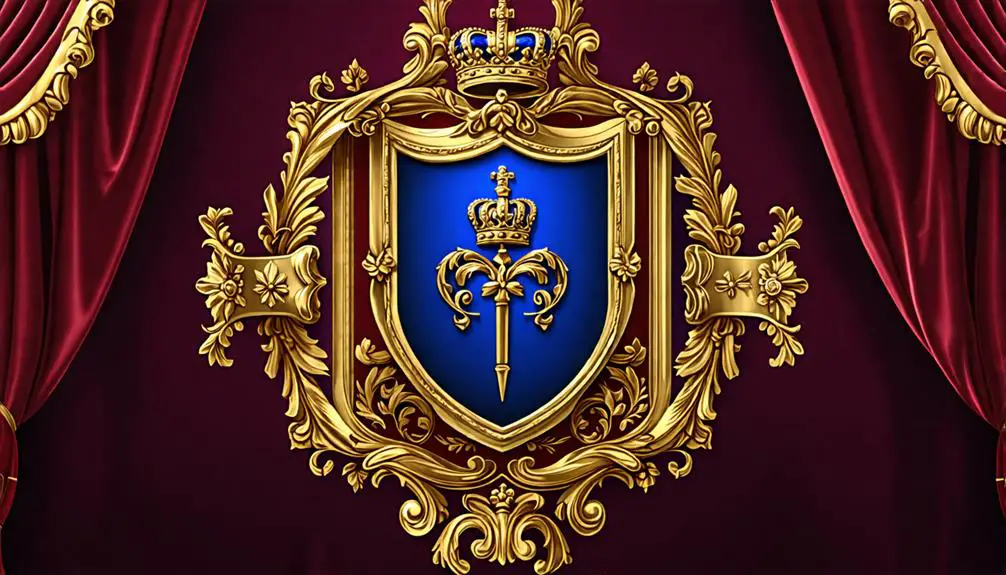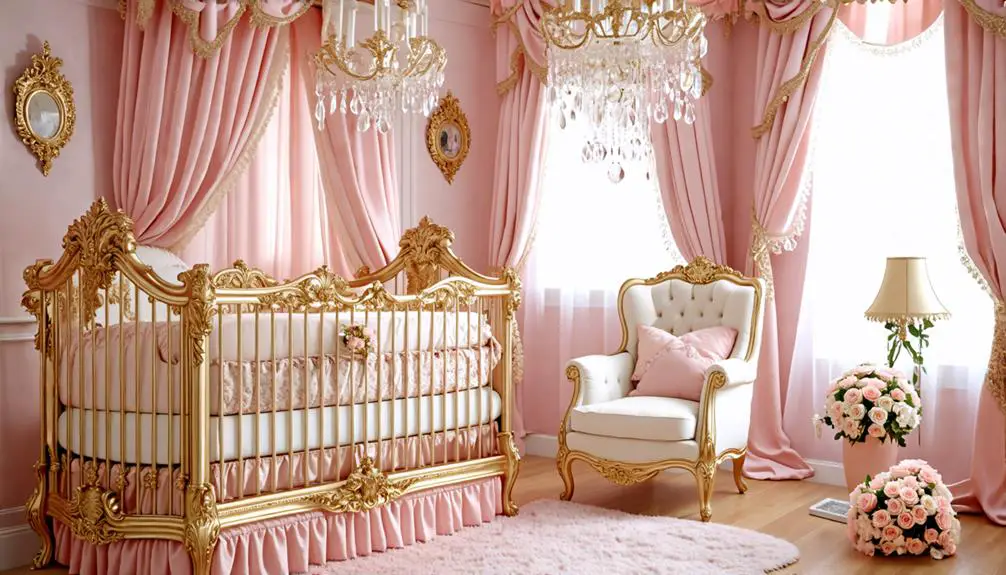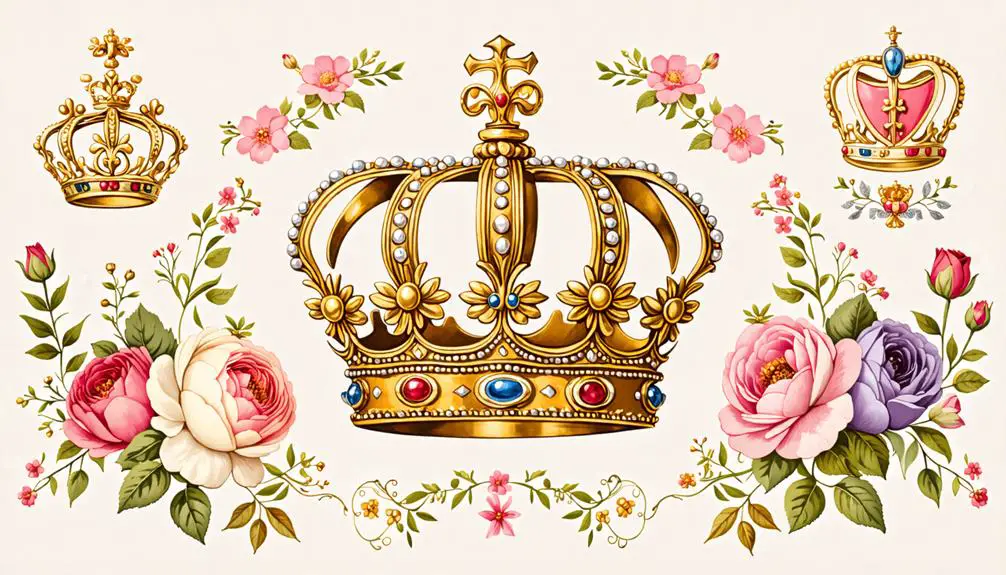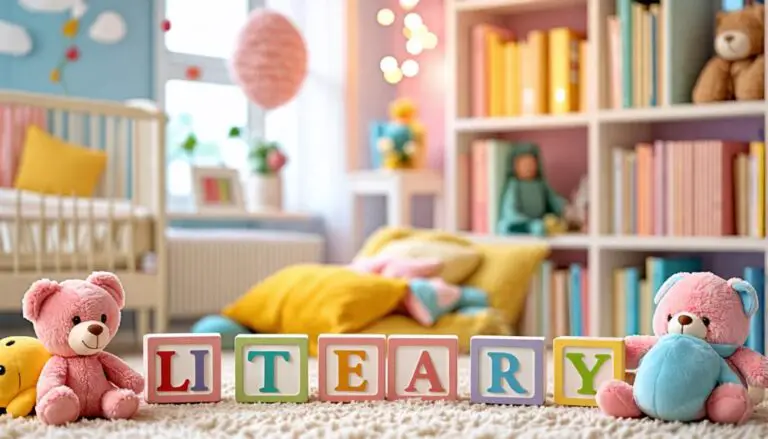Royal Baby Names: Princes, Princesses, and Nobility (Visual Inspiration)
As I explore the world of royal baby names, I'm struck by the rich history and cultural significance behind each choice. From classic names like George and Charlotte to more unique options like Lilibet, every name tells a story. I'm curious to examine the traditional naming conventions that have shaped royal families for generations, and how modern preferences are influencing these decisions. What makes a name 'royal,' and how can parents draw inspiration from these timeless choices? The answer lies in the intricate balance between heritage, meaning, and personal style – a balance I'm keen to explore further.
Key Takeaways
- Royal baby names often balance historical homage and modern significance, reflecting cultural heritage and family values.
- Classic names like George, Charlotte, and Alice are popular among royals, carrying significant historical and cultural weight.
- Middle names often honor family lineage, as seen in names like Lilibet Diana, conveying meaningful associations and aspirational qualities.
- Traditional royal names avoid trendy options, instead opting for timeless choices that evoke elegance and sophistication.
Royal Names and Their Significance

Delving into the world of royal naming conventions, I find that the choice of a name is never random, as it often reflects a careful balance between paying homage to the past and embracing the present.
Royal names hold significant historical and cultural weight, often honoring past monarchs and notable family members. I notice that classic names like George and Alice are making a comeback, thanks to their noble connotations and aspirational qualities.
The use of middle names to honor family lineage is also prevalent, as seen in names like Lilibet Diana. These naming practices not only reflect a family's cultural heritage but also convey the values and traditions that they hold dear.
Historical Royal Names to Consider
I'm now turning my attention to historical royal names that I think are worth considering for a royal baby.
When it comes to choosing a name with a rich history, I believe it's important to explore classic names and their meanings, as well as the inspirational royal figures behind them.
Royal Baby Name Trends
Exploring the domain of royal baby names reveals a treasure trove of historical significance, with many classic choices drawing from a rich legacy of monarchs and influential figures.
As I investigate royal baby name trends, I find that many popular names, such as George, Louis, and Charlotte, pay homage to historical figures.
For a royal baby girl, classic names like Elizabeth and Diana remain timeless, while Sienna and Lilibet showcase a modern twist.
Royal baby boy names, including August and Ernest, exude a regal charm.
The royal family tends to favor traditional names that reflect their heritage, shying away from trendy options.
I notice a persistent preference for names with strong meanings, underscoring the aspirational qualities of nobility and solidifying the legacy of the royal family.
Classic Names and Meanings
As I explore the domain of classic royal names, I notice that many of these enduring choices not only reflect the rich history of the British monarchy but also carry significant meanings that have contributed to their lasting appeal.
These timeless names, such as Elizabeth and Victoria, evoke a sense of grandeur and nobility, representing iconic queens who left their mark on the nation.
Here are a few of my favorite classic royal names with deep meanings:
- Elizabeth: a name that symbolizes strength and resilience
- Victoria: a name that represents victory and triumph
- Alice: a name that signifies nobility and elegance
- Catherine: a name that embodies purity and innocence
These classic names continue to be popular baby names, favored by contemporary royals and parents alike.
Inspirational Royal Figures
I find historical royal figures leave lasting impressions on the world of baby naming, with parents drawing inspiration from legendary monarchs and their timeless names.
I'm particularly drawn to names like Alice, associated with Princess Alice of Battenberg, which means 'from nobility' and exudes a sense of royal lineage.
I also consider Catherine, a classic name linked to influential royals like Catherine the Great and Catherine Middleton, conveying purity and strength.
Elizabeth is another name that stands out, symbolizing resilience and strength in royalty.
Additionally, Diana and her humanitarian efforts have made her name synonymous with compassion and kindness.
These names aren't only popular but also noble, making them perfect for parents looking to bestow a piece of history upon their child.
Elegant Royal Names for Girls

As I explore elegant royal names for girls, I'm drawn to timeless choices that exude refinement and sophistication.
I'll be sharing my top picks for regal names that have inspired generations of royal families, from the British monarchy to noble households around the world.
From classic female names that echo through history to contemporary choices that still evoke a sense of majesty, I'll cover the most exquisite options for parents-to-be seeking a royal touch.
Timeless Royal Name Choices
Timeless royal name choices for girls often boast strong historical ties and classic charm, reflecting the elegance and sophistication that define royal lineage.
I'm drawn to elegant names that have been favored by European monarchies for centuries. Here are some of my top picks:
- Charlotte, a classic name currently ranked 3rd in popularity, means 'Petite' and has a rich history in royal circles.
- Alice, meaning 'From nobility,' has been associated with British and Monaco royalty.
- Beatrice, derived from French, means 'Bringer of joy' and has deep roots in royal lineage.
- Catherine, meaning 'Pure,' is a timeless choice with connections to various European monarchies.
Regal Names for Inspiration
Five regal names that continue to inspire parents around the world are steeped in history and tradition, evoking the elegance and refinement of European royalty.
I'm particularly drawn to Elizabeth, a classic choice associated with numerous queens, which remains timeless in royal lineage.
Diana, meaning 'heavenly' or 'divine,' honors the beloved late Princess Diana and has historical significance tied to British royalty.
Alice, meaning 'from nobility,' was popularized by royal figures and peaked at No. 8 in 1906.
Another popular choice is Beatrice, meaning 'bringer of joy,' which has royal connections through figures like Princess Beatrice of York.
These royal names – Elizabeth, Diana, Alice, and Beatrice – aren't only regal but also rich in history, making them perfect for parents looking for elegant and refined names for their little princess.
Classic Royal Female Names
I find myself drawn to classic royal female names that exude elegance and refinement, such as Charlotte and Elizabeth, which have been favored by European royalty for centuries. These timeless choices evoke a sense of tradition and sophistication.
Here are some of my favorite classic royal female names:
- Charlotte: A popular choice ranking 3rd in 2023, perfect for a little princess
- Elizabeth: Associated with numerous queens across Europe, a truly regal name
- Alice: Meaning 'from nobility,' a strong and elegant choice
- Diana: Heavenly and beloved, just like the iconic Princess Diana
These names, along with others like Beatrice, Eugenie, and Grace, remind me of the beauty and charm of royal heritage.
Strong Royal Names for Boys
Choosing a royal name for a boy often means drawing from a rich history of strong, classic options that have been favored by monarchies for centuries.
I find myself drawn to timeless choices like George and William, which have been popular among royal boys for generations. George, meaning 'farmer', has been held by six British kings, while William is a classic royal name that evokes a sense of tradition.
Other strong options include Charles, James, and Henry, each with its own unique history and significance. For a more unique twist, I consider names like Augustus, Darius, Frederick, and Philip, which blend tradition with sophistication.
These royal names not only reflect a sense of heritage but also convey strength and character.
Trends in Royal Baby Names

As I explore the world of royal baby names, it becomes clear that certain trends have emerged, reflecting a balance between honoring historical heritage and embracing contemporary influences.
I notice that many royal names incorporate classic origins, conveying timeless selections with noble connotations. However, recent choices also reveal a blend of traditional and unique influences, appealing to contemporary preferences.
Some notable trends in royal baby names include:
- A mix of traditional and modern names, such as Sienna and Lilibet.
- The use of multiple middle names to honor familial importance.
- Incorporating classic origins to maintain noble connotations.
- A shift towards gender-neutral names, reflecting diversity in royal naming practices.
Unique Royal Names and Meanings
Beyond the established trends in royal naming practices, unique names with rich histories and meanings have emerged, adding another layer of depth to the storied world of royal nomenclature.
I'm fascinated by names that reflect a deep connection to royal lineage, such as Eugenie, meaning 'nobility,' which is tied to Queen Victoria's lineage.
Lilibet, a variant of Elizabeth, carries personal familial history, being the childhood nickname of Queen Elizabeth II and recently chosen for Prince Harry's daughter.
Other unique royal names include Amina, meaning 'trustworthy,' which reflects cultural significance and is linked to Nigerian royalty.
I also appreciate names like Charlotte, meaning 'petite,' which has become popular in modern royals, including Princess Charlotte.
These names showcase the diversity and history in royal naming.
Conclusion
As I reflect on the world of royal baby names, I'm struck by the delicate balance between heritage and innovation.
The allure of classic names like George and Charlotte lies in their timeless elegance, while unique choices like Lilibet and Amina showcase a more nuanced approach to tradition.
By embracing this blend of old and new, parents can bestow upon their child a name that not only honors the past but also whispers promises of a bright future.







